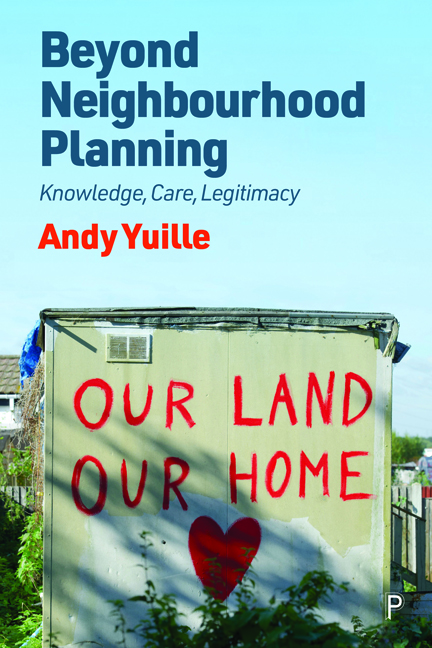Book contents
- Frontmatter
- Contents
- List of figures and table
- Acknowledgements
- Preface
- 1 Introduction: Neighbourhood planners and the turn to participation
- 2 Planning, participation and democratisation
- 3 Knowledge, politics and care: perspectives from Science and Technology Studies
- 4 Neighbourhoods, identity and legitimacy
- 5 Experience, evidence and examination
- 6 Expertise, agency and power
- 7 Care and concern
- 8 Conclusion: Neighbourhood planning and beyond
- Notes
- References
- Index
5 - Experience, evidence and examination
Published online by Cambridge University Press: 20 January 2024
- Frontmatter
- Contents
- List of figures and table
- Acknowledgements
- Preface
- 1 Introduction: Neighbourhood planners and the turn to participation
- 2 Planning, participation and democratisation
- 3 Knowledge, politics and care: perspectives from Science and Technology Studies
- 4 Neighbourhoods, identity and legitimacy
- 5 Experience, evidence and examination
- 6 Expertise, agency and power
- 7 Care and concern
- 8 Conclusion: Neighbourhood planning and beyond
- Notes
- References
- Index
Summary
‘What you’re saying is we need an evidence base, that has power, if it's evidence no one can say no to it.’
Martin (Oakley neighbourhood planning group [NPG] member, March 2015)Introduction
This chapter is about the production and use of evidence – of knowledge claims. As Oakley NPG member Martin identifies in the opening quotation, what the NPG and the neighbourhood know about their neighbourhood, and why they care about it, must be codified into acceptable material forms of evidence to justify their policy proposals. However, as observed in previous chapters, government guidance on what this evidence might consist of is loose and light-touch, stating that ‘there is no “tick box” list of evidence required for Neighbourhood Planning. Proportionate, robust evidence should support the choices made and the approach taken. The evidence should be drawn upon to explain succinctly the intention and rationale of the policies in the draft neighbourhood plan’ (DCLG, 2014b).
In Chapter 4 I set out three distinct identities enacted by and for NPGs, associated with three distinct kinds of knowledge and sources of legitimacy, then briefly explored how these identities were also enacted in different participatory settings. In this chapter I examine one of the central mechanisms through which these identities are enacted and come to dominate or be suppressed: the translation and inscription of particular types of knowledge into evidence. I outline the requirements on neighbourhood plans to be evidence-based, sketch out what is conventionally counted as evidence in the planning system, and then suggest why the kind of evidence produced to support a neighbourhood plan might be expected to be more expansive, inclusive and varied. Next, I document two instances of evidence production, one from each of my case studies, exploring how NPGs interpreted what counts as evidence. I discuss the implications of these findings, analysing how what counts as evidence rests upon assumptions about the legitimacy of different kinds of knowledge, illustrating the performativity of ‘evidence’ as a concept. I then consider how the production and presentation of knowledge claims, and their associations with different relational identities, varies across other participatory settings.
- Type
- Chapter
- Information
- Beyond Neighbourhood PlanningKnowledge, Care, Legitimacy, pp. 127 - 163Publisher: Bristol University PressPrint publication year: 2023

